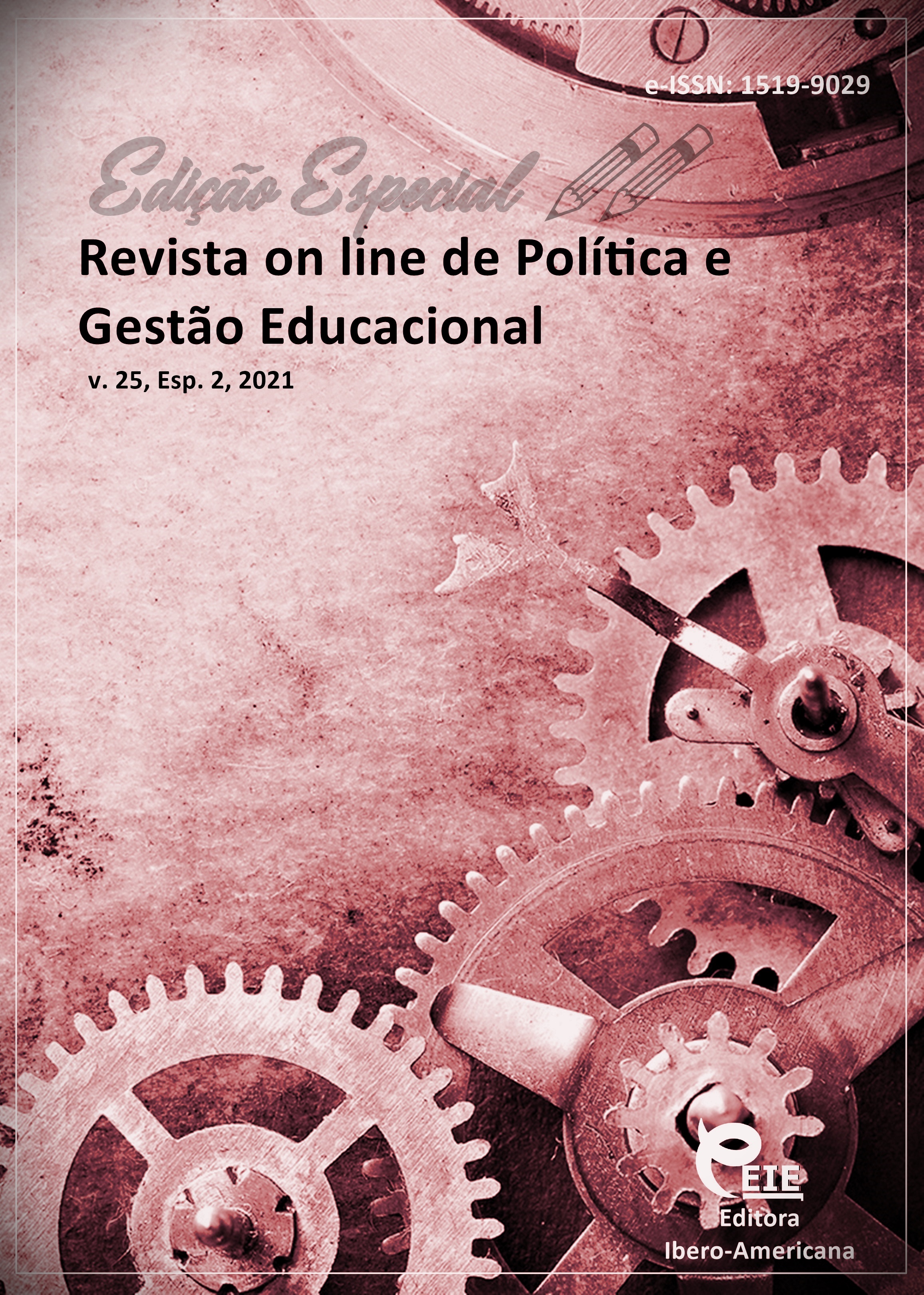Apoio organizacional para a formação de tradutores de Língua de Sinais Russa em instituições de educação
DOI:
https://doi.org/10.22633/rpge.v25iesp.2.15284Palavras-chave:
Formação de tradutores, Língua russa de sinais, Processo educacional, Formação profissionalResumo
As línguas de sinais são consequência do desenvolvimento da sociedade moderna, confirmação de sua inclusividade, orientação social, atenção a cada membro da sociedade, independentemente de suas possibilidades. As necessidades da sociedade por conhecimento da língua de sinais são grandes, e não apenas porque parte dela não consegue se comunicar de outra forma. Mas porque tal conhecimento da linguagem de sinais é projetado para eliminar e compensar inúmeras barreiras de interação. O artigo contém materiais para análise de princípios gerais de organização de treinamento, condições consagradas legislativamente para organizar o processo de treinamento de tradutores de língua de sinais russa (RSL) com base em instituições de ensino profissionalizante secundário ou superior, bem como a experiência de implementação de tais programas em várias organizações educacionais. A indução, a dedução, a análise da literatura, a análise comparativa e a observação não estruturada são utilizadas como métodos de pesquisa. O resultado da pesquisa será uma série de propostas baseadas na experiência docente e em documentos normativos recomendados para uso no processo educacional. Os autores oferecem sua própria visão dos aspectos organizacionais, cujas disposições são aconselháveis para usar na organização de treinamento para tradutores da RSL.
Downloads
Referências
AFANASYEVA, O. O. The system of independent certification of sign language translators. In: CENTRAL RESEARCH INSTITUTE OF RUSSIAN SIGN LANGUAGE: MATERIALS OF THE SCIENTIFIC AND PRACTICAL CONFERENCE, 2018. Proceedings [...]. 2018. p. 147-150.
ALIKINA, E. V. Сoncept of teaching translators in the system of higher linguistic education on the basis of an integrative approach. Nizhny Novgorod: Nizhny Novgorod State Linguistic University, 2017.
ARSKIY, A. A. Actual problems of teaching Russian sign language to police officers. Scientific component, v. 1, n. 5, p. 111-118, 2020.
KOPNINA, O. O. Training of specialists to work with deaf-blind citizens (experience of social partnership). Russian science and education today: problems and prospects, v. 3, n. 6, p. 72-74, 2015.
KOSYANCHUK, A. S. On the creation of optimal psychological and pedagogical conditions and the use of modern methods of teaching Russian sign language. Scientific Digest of the East Siberian Institute of the Ministry of Internal Affairs of Russia, v. 1, n. 4, p. 154-159, 2020.
LIPINA, E. A. From the experience of teaching Russian sign language to police officers in the system of additional professional education. Psychopedagogy in law enforcement agencies, v. 1, n. 72, p. 79-85, 2018.
LYSKOVA, M. I. Organizational and methodological foundations of teaching Russian sign language to employees of internal affairs bodies of the Russian Federation. Bulletin of the Tyumen Institute for Advanced Training of Employees of the Ministry of Internal Affairs of Russia, v. 1, n. 8, p. 183-189, 2017.
MINAEVA, E. S. Motivational criteria for the formation of readiness for professional activity of Russian sign language translators. Society: sociology, psychology, pedagogy, v. 7, n. 75, p. 113-117, 2020.
RUSSIA. Clarifications on the implementation of FSES of secondary (complete) general education (specialized training), formed on the basis of the FSES NiSPE. Approved by the NMS of the Center for Primary, Secondary, Higher and Additional Education FSI "FIRO", Protocol No. 1, 3 Feb. 2011a.
RUSSIA. Explanations on the formation of the curriculum for the OBEP NiSPO. Approved by the NMS of the Center for Primary, Secondary, Higher and Additional Education of the Federal State Institution "FIRO", Protocol No. 1, 3 Feb. 2011b.
RUSSIA. Federal Law N 296-FZ. On Amendments to Articles 14 and 19 of the Federal Law" On Social Protection of Disabled People in the Russian Federation. 30 Dec. 2012a.
RUSSIA. Federal Law N 273-FZ. On Education in the Russian Federation, 29 Dec. 2012b.
RUSSIA. Letter of the Ministry of Education and Science of the Russian Federation No. 12-696. On clarifications on the formation of the curriculum for OBEP NISPO. 20 Oct. 2010.
RUSSIA. Letter of the Ministry of Education and Science of the Russian Federation No. 06-903. On the direction of methodological recommendations for updating the current federal state educational standards of secondary vocational education, taking into account the accepted professional standards. 5 Aug. 2015.
RUSSIA. Order of the Ministry of Education and Science of the Russian Federation N 507. On approval of the federal state educational standard of secondary vocational education in the specialty 39.02.02 Organization of signage communication. 12 May 2014.
RUSSIA. Order of the Ministry of Science and Higher Education of the Russian Federation and the Ministry of Education of the Russian Federation N 885/390. On the practical training of students. 5 Aug. 2020.
SVINAREV, S. V. Problems of teaching Russian sign language in the system of higher educational institutions of the Ministry of Internal Affairs of Russia on vocational training programs. Questions of pedagogy, v. l, n. 1-2, p. 222-226, 2020.
VARINOVA, O. A. Requirements for the profession of a translator of Russian sign language in modern conditions. Scientific works of the Central Research Institute of Russian Sign Language: Materials of the Scientific and Practical Conference, 2018. p. 159-168.
VLASOVA, L. P.; KUDRYASHOVA, E. M.; SEMENOVA, N. A. Training of sign language translators. Theoretical and practical issues of psychology and pedagogy: a collection of articles of the International scientific-practical conference, 2015. p. 80-85.
ZIKRATOV, V. V. On models of teaching Russian sign language. Science. Education. Culture. Actual problems and practice of solution (federal and regional aspects). ALL-RUSSIAN SCIENTIFIC-PRACTICAL CONFERENCE WITH INTERNATIONAL PARTICIPATION, 11., 2018. Proceedings [...]. 2018. p. 10-13.
Downloads
Publicado
Como Citar
Edição
Seção
Licença
Copyright (c) 2021 Revista on line de Política e Gestão Educacional

Este trabalho está licenciado sob uma licença Creative Commons Attribution-NonCommercial-ShareAlike 4.0 International License.
Manuscritos aceitos e publicados são de propriedade da Revista on line de Política e Gestão Educacional. É vedada a submissão integral ou parcial do manuscrito a qualquer outro periódico. A responsabilidade do conteúdo dos artigos é exclusiva dos autores. É vedada a tradução para outro idioma sem a autorização escrita do Editor ouvida a Comissão Editorial Científica.











